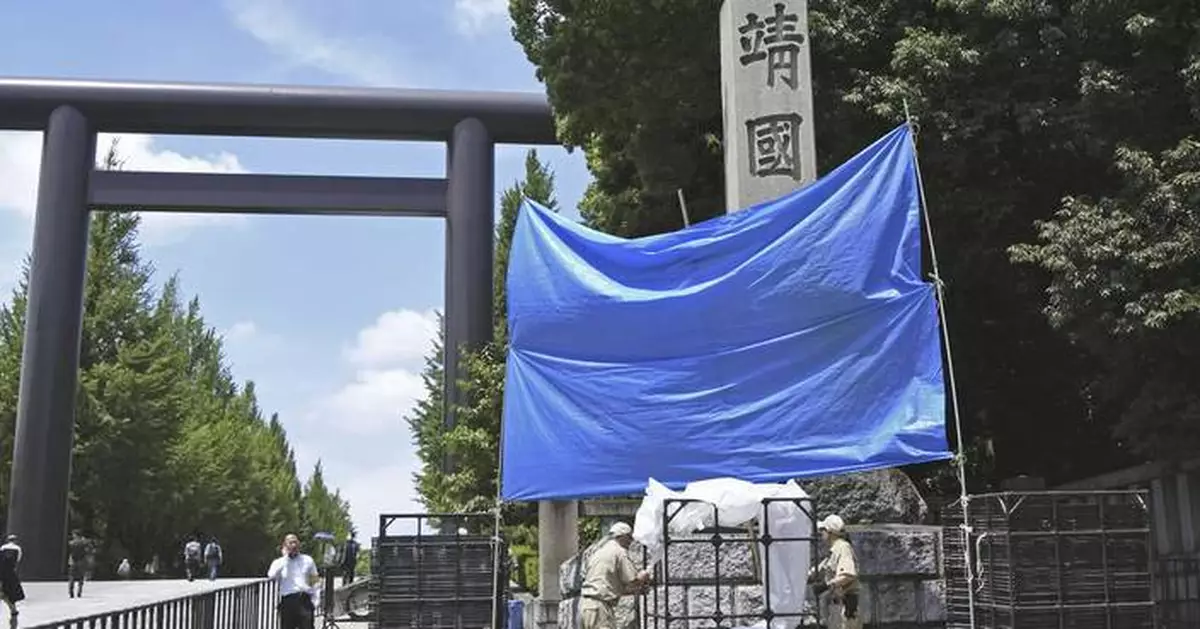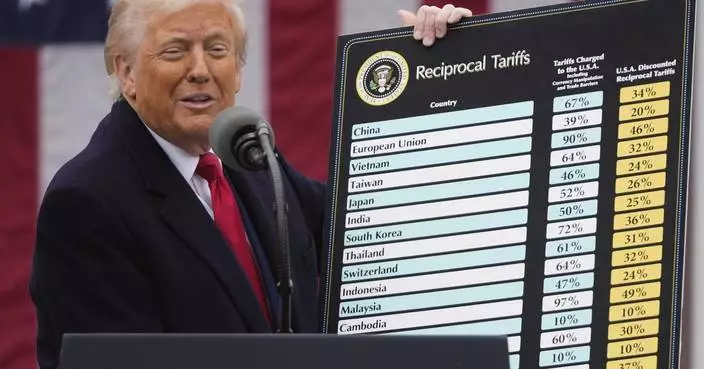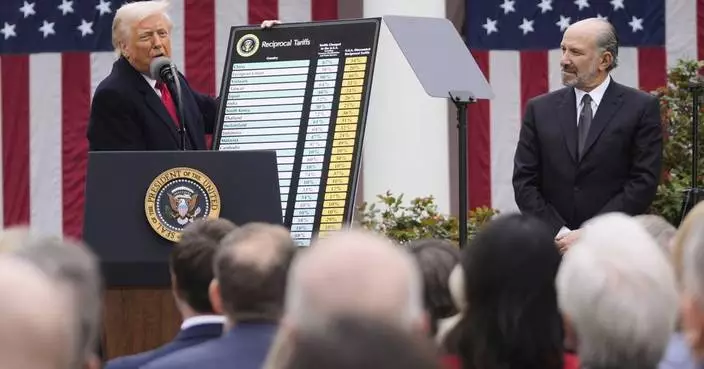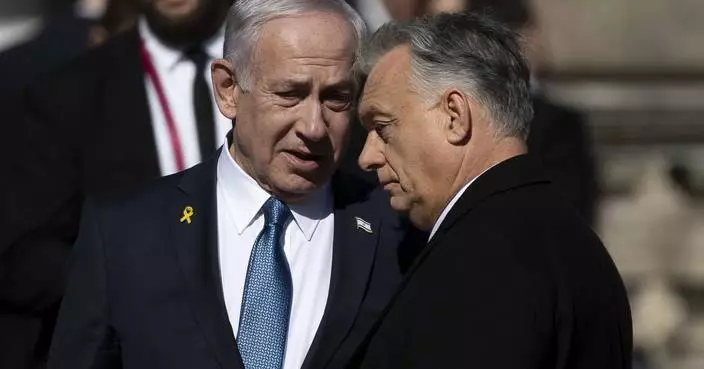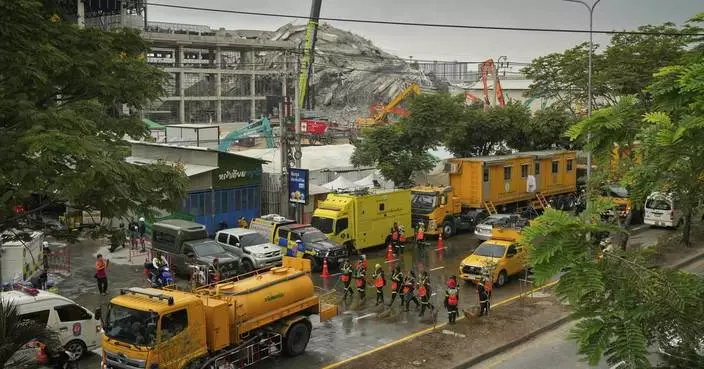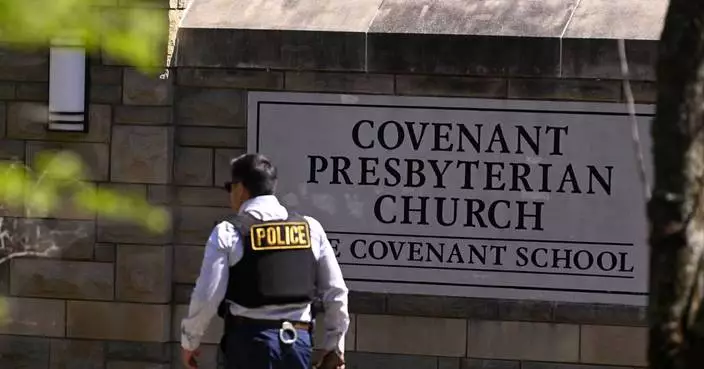TOKYO (AP) — Japanese police are searching for the suspects who spray-painted the word “toilet” on a Tokyo shrine that commemorates the country's war dead, in an apparent protest against the release of treated radioactive wastewater from the Fukushima nuclear power plant, officials and news reports said.
The red graffiti on a stone pillar at the entrance of Yasukuni Shrine was discovered early Saturday. In a video posted on Chinese social media, a man who identified himself as Iron Head criticized the discharge of wastewater from the damaged nuclear power plant into the ocean.
“Faced with the Japanese government's permission to discharge nuclear wastewater, can we do anything?" the man asks. “No, I will give them some color to see.”
In another part of the video taken at night, he is seen apparently urinating on the pillar and using spray paint to write “toilet” in English.
Tokyo police are investigating at least two suspects, the person who appeared in the video and another who shot it, according to Japanese media including NHK public television and Kyodo News agency. The reports said police believed the incident occurred late Friday after the shrine closed and that the perpetrator is believed to have already left Japan, they said.
Police declined to confirm the reports.
Yasukuni Shrine, in a statement emailed to the Associated Press, said the graffiti was “extremely regrettable” and said it was “an act of degrading the dignity of the shrine.” The shrine said it will continue patroling so that visitors can pay respects in "a tranquil environment.” Yasukuni Shrine declined further comment, saying it has reported the damage to police and investigation is underway.
The discharge of wastewater from the damaged Fukushima nuclear plant has been opposed by fishing groups and neighboring countries, especially China, which imposed a ban on all imports of Japanese seafood immediately after the release began in August. The ban has particularly affected Japanese scallop growers and exporters to China.
Yasukuni Shrine honors about 2.5 million Japanese war dead, including convicted war criminals. Victims of Japanese aggression during the first half of the 20th century, especially China and the Koreas, see the shrine as a symbol of Japanese militarism. The countries criticize visits by Japanese lawmakers to the shrine as signs of their lack of remorse over Japan’s wartime actions.
The graffiti appeared to have been cleaned by Monday.
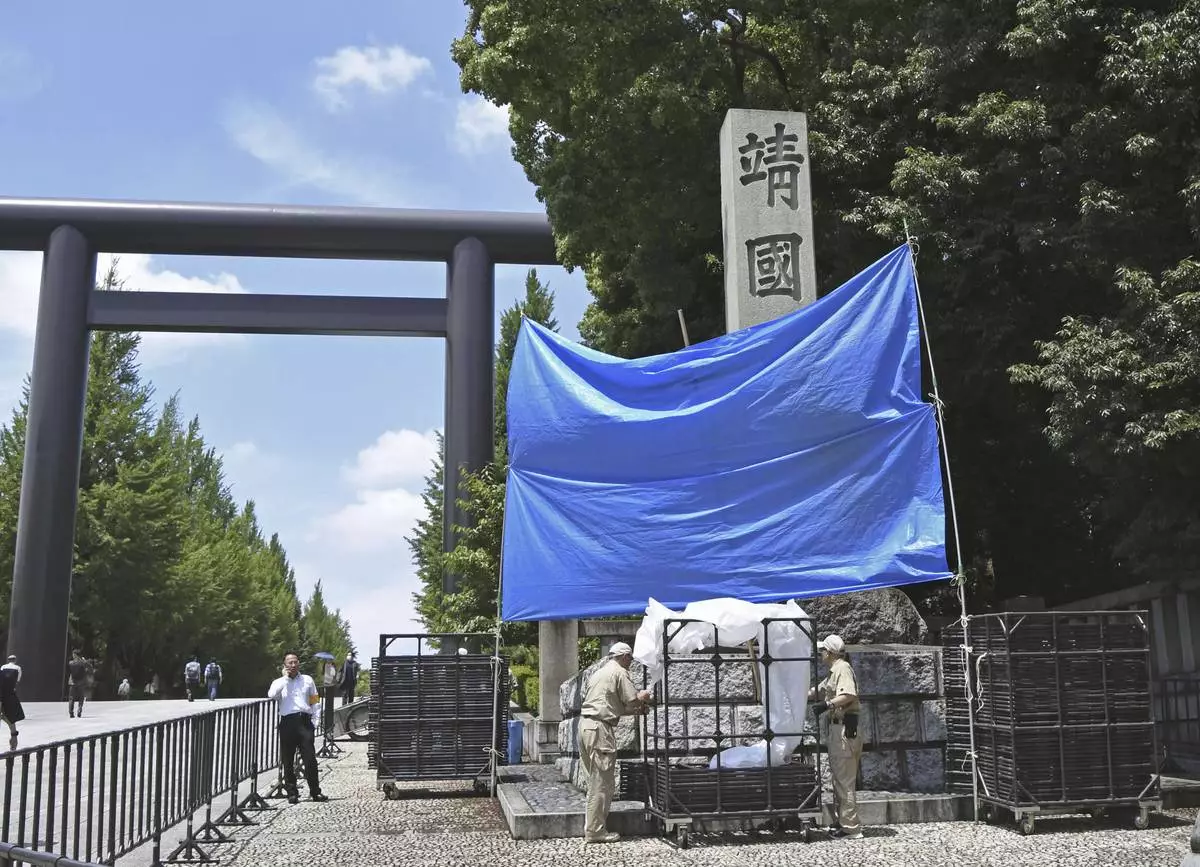
Workers prepare to remove a graffiti on Yasukuni Shrine's stone pillar, covered under a blue sheet in Tokyo on June 1, 2024. (Kyodo News via AP)
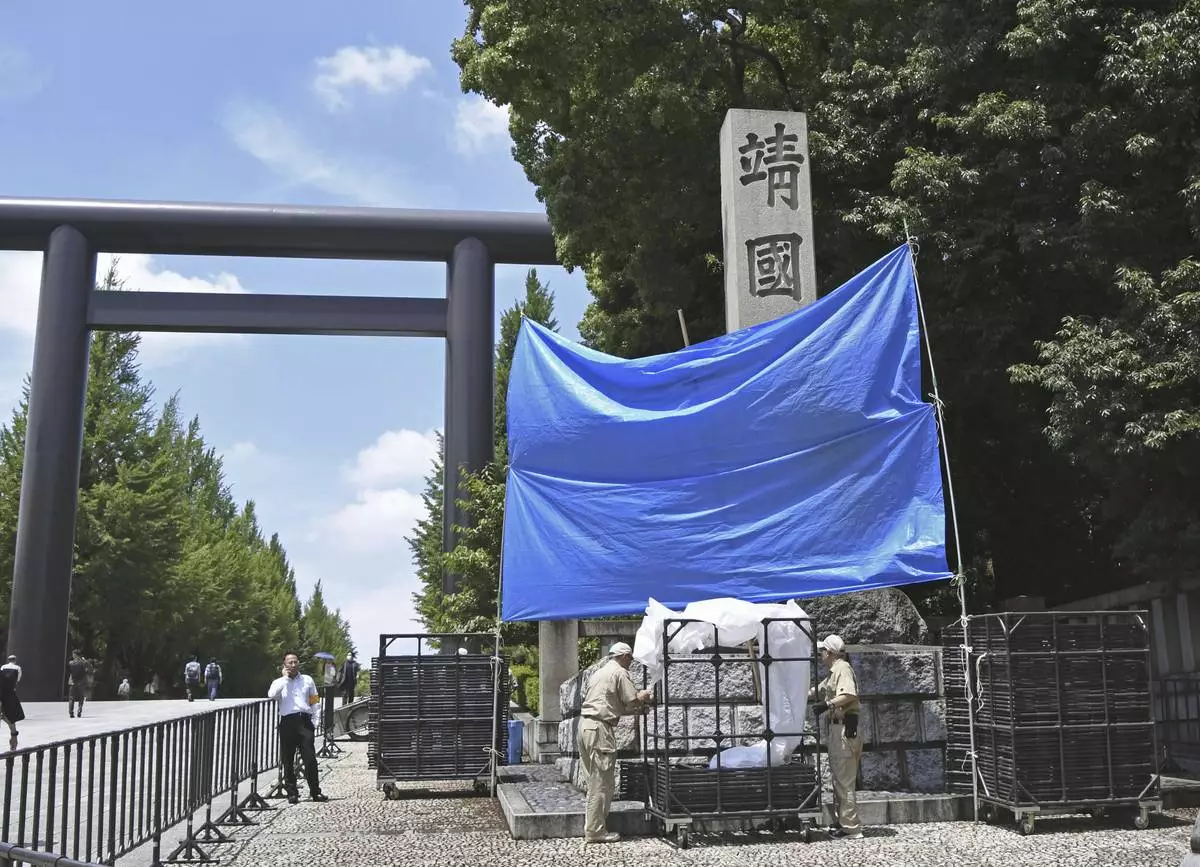
Workers attend to removing a graffiti on Yasukuni Shrine's stone pillar, covered under blue sheet in Tokyo, on June 1, 2024.(Kyodo News via AP)
SRINAGAR, India (AP) — The Lower House of India's parliament early Thursday passed a controversial bill moved by Prime Minister Narendra Modi’s Hindu nationalist government to amend laws governing Muslim land endowments.
The bill would add non-Muslims to boards that manage waqf land endowments and give the government a larger role in validating their land holdings. The government says the changes will help to fight corruption and mismanagement while promoting diversity, but critics fear that it will further undermine the rights of the country’s Muslim minority and could be used to confiscate historic mosques and other property.
As hourslong debate in the Lower House grew heated as the Congress-led opposition firmly opposed the proposal, calling it unconstitutional and discriminatory against Muslims. Modi’s ruling Bharatiya Janata Party lacks a majority in the Lower House, but its allies helped to pass the bill.
The debate that began Wednesday ended with 288 members voting for the bill while 232 were against it early Thursday. The bill will now need to clear the Upper House before it is sent to President Droupadi Murmu for her assent to become law.
Later Thursday, lawmakers in the Upper House began debating the bill. At least eight hours have been set aside for discussion.
Minority Affairs Minister Kiren Rijiju introduced the bill to change a 1995 law that set rules for the foundations and set up state-level boards to administer them.
Many Muslim groups as well as the opposition parties say the proposal is discriminatory, politically motivated and an attempt by Modi’s ruling party to weaken minority rights.
The bill was first introduced in parliament last year, and opposition leaders have said some of their subsequent proposals on it were ignored. The government has said opposition parties are using rumors to discredit them and block transparency in managing the endowments.
Waqfs are a traditional type of Islamic charitable foundation in which a donor permanently sets aside property — often but not always real estate — for religious or charitable purposes. Waqf properties cannot be sold or transferred.
Waqfs in India control 872,000 properties that cover 405,000 hectares (1 million acres) of land, worth an estimated $14.22 billion. Some of these endowments date back centuries, and many are used for mosques, seminaries, graveyards and orphanages.
In India, waqf property is managed by semi-official boards, one for each state and federally run union territory. The law would require non-Muslims to be appointed to the boards.
Currently, waqf boards are staffed by Muslims, like similar bodies that help administer other religious charities.
During the parliamentary debate, Home Minister Amit Shah said non-Muslims would be included in waqf boards only for administration purposes and helping run the endowments smoothly. He added that they were not there to interfere in religious affairs.
“The (non-Muslim) members will monitor whether the administration is running as per law or not, and whether the donations are being used for what they were intended or not,” he said.
One of the most controversial changes is to ownership rules, which could impact historical mosques, shrines and graveyards since many such properties lack formal documentation as they were donated without legal records decades, and even centuries, ago.
Other changes could impact mosques on land held in centuries-old waqfs.
Radical Hindu groups have laid claim to several mosques around India, arguing they are built on the ruins of important Hindu temples. Many such cases are pending in courts.
The law would require waqf boards to seek approval from a district level officer to confirm the waqfs’ claims to property.
Critics say that would undermine the board and could lead to Muslims being stripped of their land. It’s not clear how often the boards would be asked to confirm such claims to land.
“The Waqf (Amendment) Bill is a weapon aimed at marginalising Muslims and usurping their personal laws and property rights,” Rahul Gandhi, the main opposition leader, wrote on social media platform X. He said the bill was an “attack on the Constitution” by the BJP and its allies “aimed at Muslims today but sets a precedent to target other communities in the future.”
While many Muslims agree that waqfs suffer from corruption, encroachments and poor management, they also fear that the new law could give India’s Hindu nationalist government far greater control over Muslim properties, particularly at a time when attacks against minority communities have become more aggressive under Modi, with Muslims often targeted for everything from their food and clothing styles to inter-religious marriages.
Last month, the U.S. Commission on International Religious Freedom said in its annual report that religious freedom conditions in India continued to deteriorate while Modi and his party “propagated hateful rhetoric and disinformation against Muslims and other religious minorities” during last year’s election campaign.
Modi’s government says India is run on democratic principles of equality and no discrimination exists in the country.
Muslims, who are 14% of India’s 1.4 billion population, are the largest minority group in the Hindu-majority nation but they are also the poorest, a 2013 government survey found.
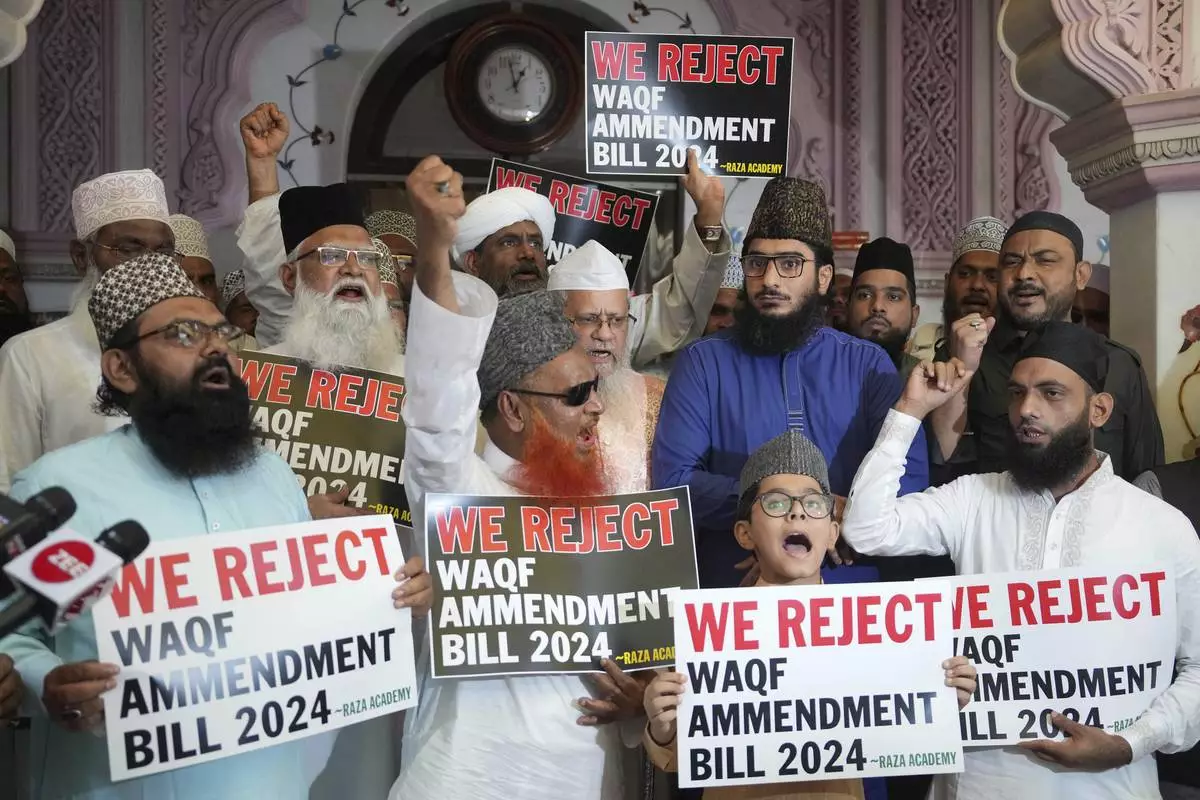
Raza Academy members shout slogans in Mumbai, India, to condemn the Waqf amendment bill that was passed early Thursday by the Lower House of India's parliament, Thursday, April 3, 2025. (AP Photo/Rajanish Kakade)
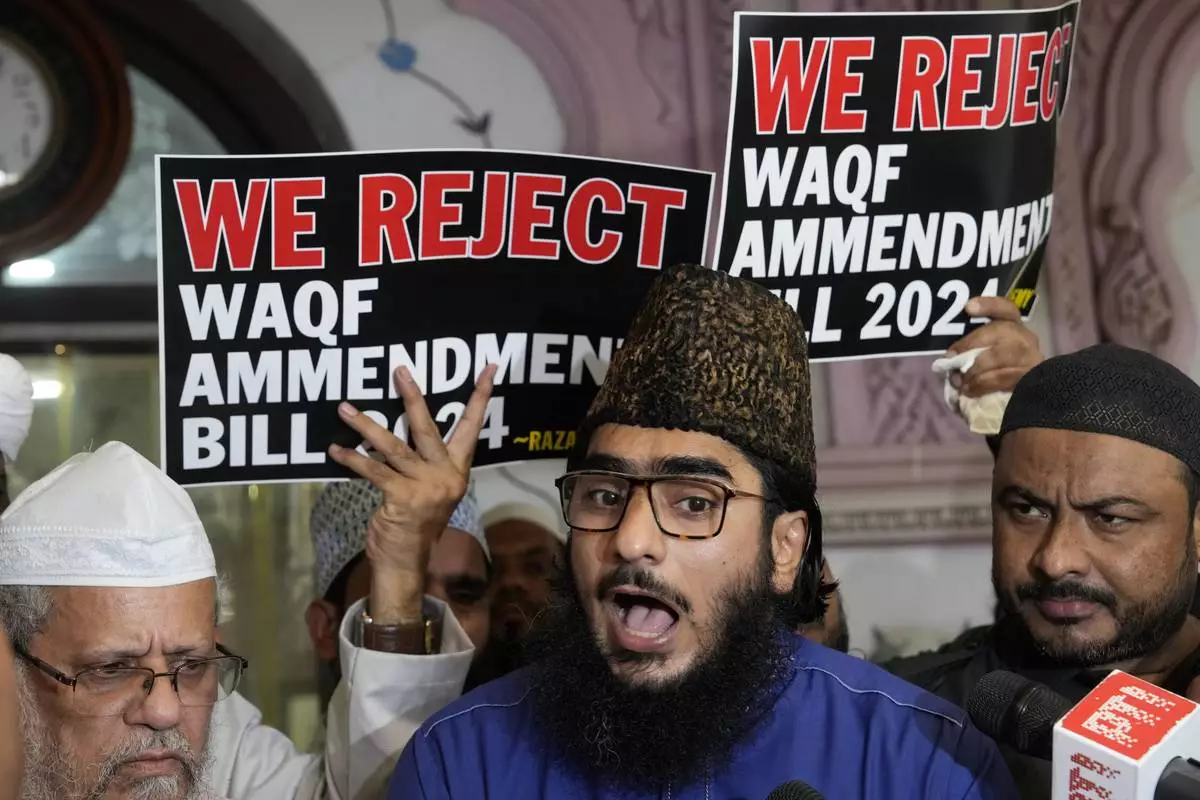
Raza Academy members shout slogans in Mumbai, India, to condemn the Waqf amendment bill that was passed early Thursday by the Lower House of India's parliament, Thursday, April 3, 2025. (AP Photo/Rajanish Kakade)
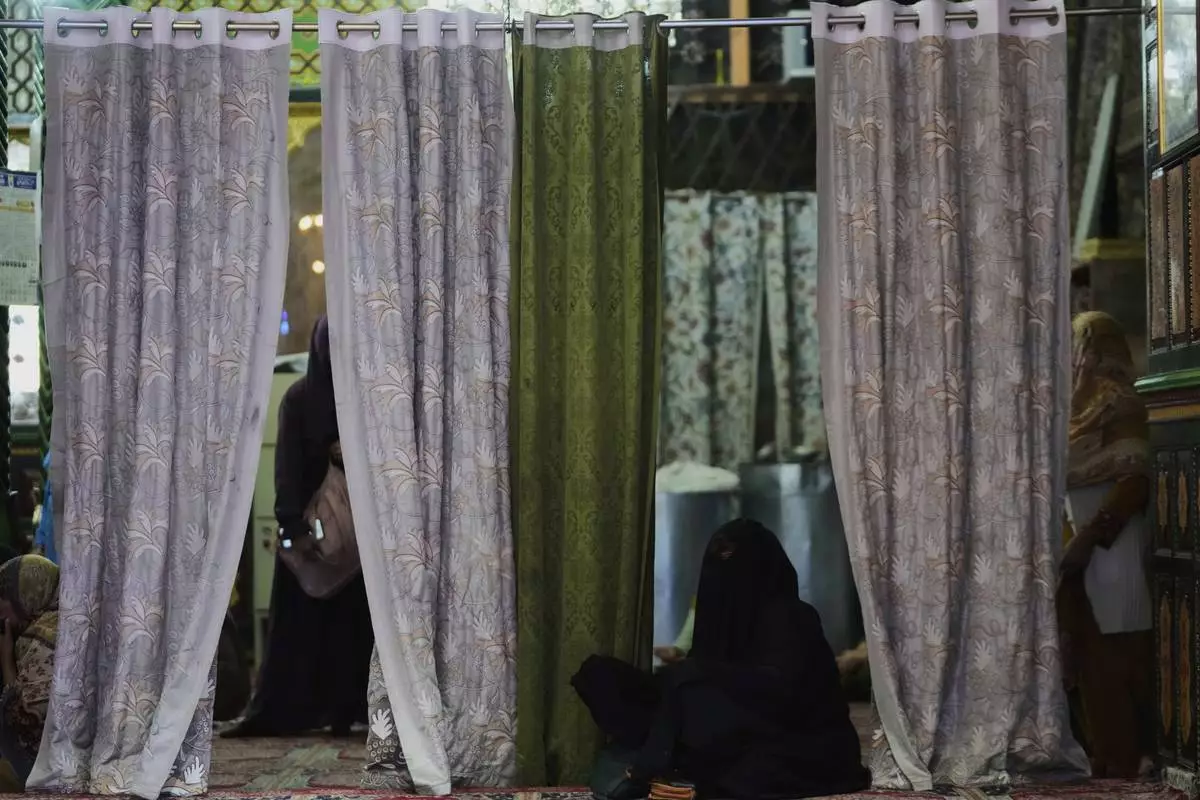
A Kashmiri Muslim woman prays inside the shrine of Sheikh Abdul Qadir Jeelani, commonly known as Dastageer Sahib, in Srinagar, Indian controlled Kashmir, Wednesday, April 2, 2025. (AP Photo/Mukhtar Khan)
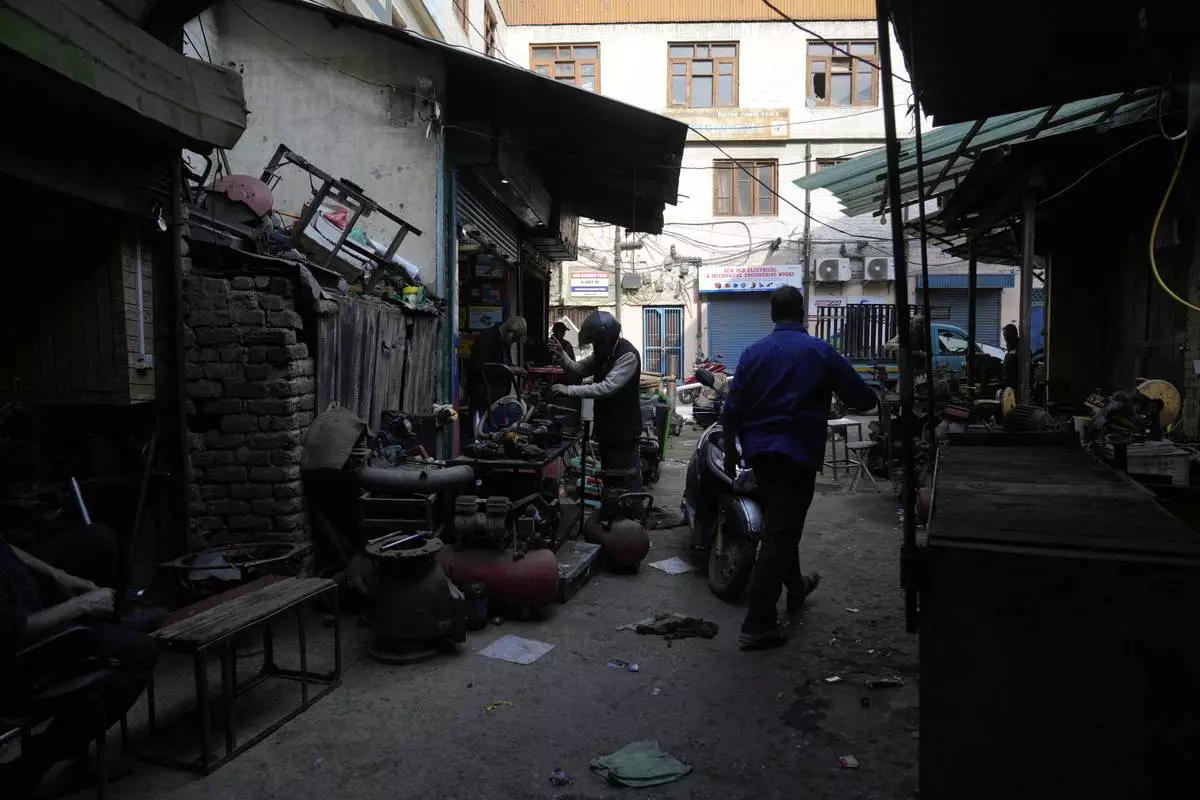
A Kashmiri man repairs a generator inside the Auqaf Market in Srinagar, Indian controlled Kashmir, Wednesday, April 2, 2025. (AP Photo/Mukhtar Khan)
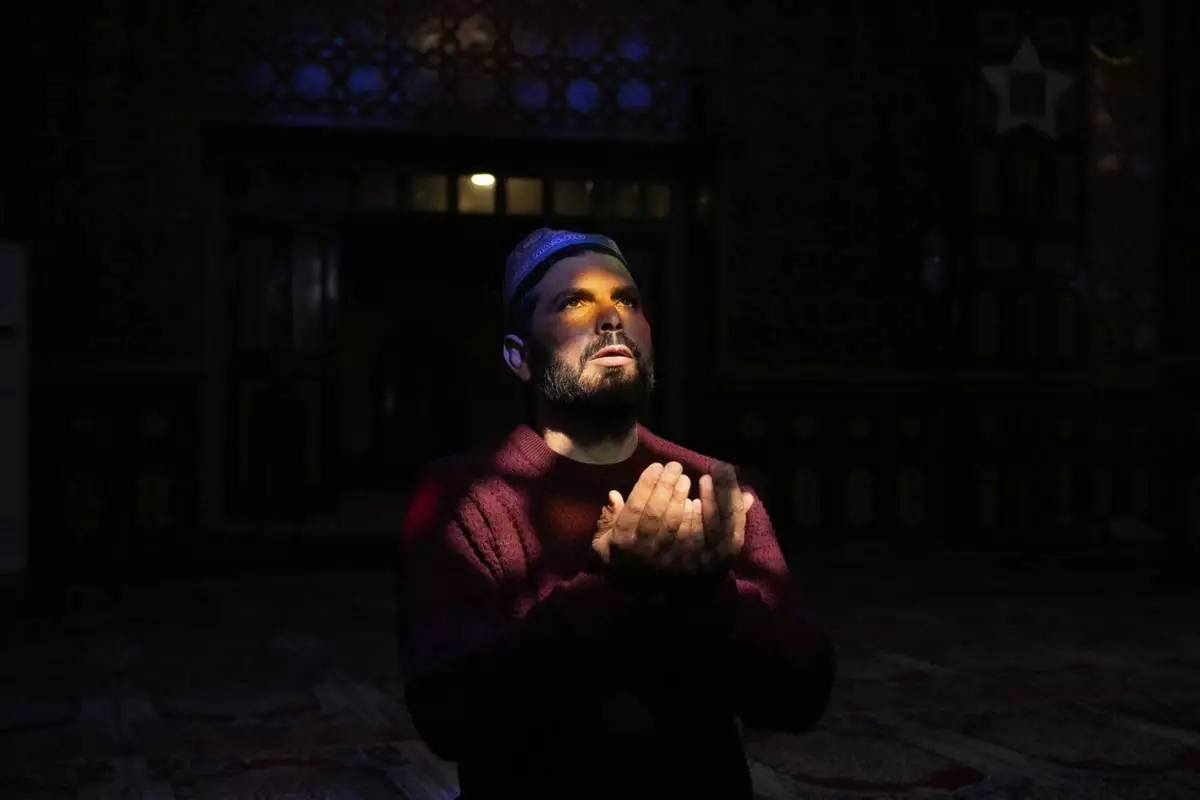
A Kashmiri Muslim man prays inside the shrine of Sheikh Abdul Qadir Jeelani, commonly known as Dastageer Sahib, in Srinagar, Indian controlled Kashmir, Wednesday, April 2, 2025. (AP Photo/Mukhtar Khan)
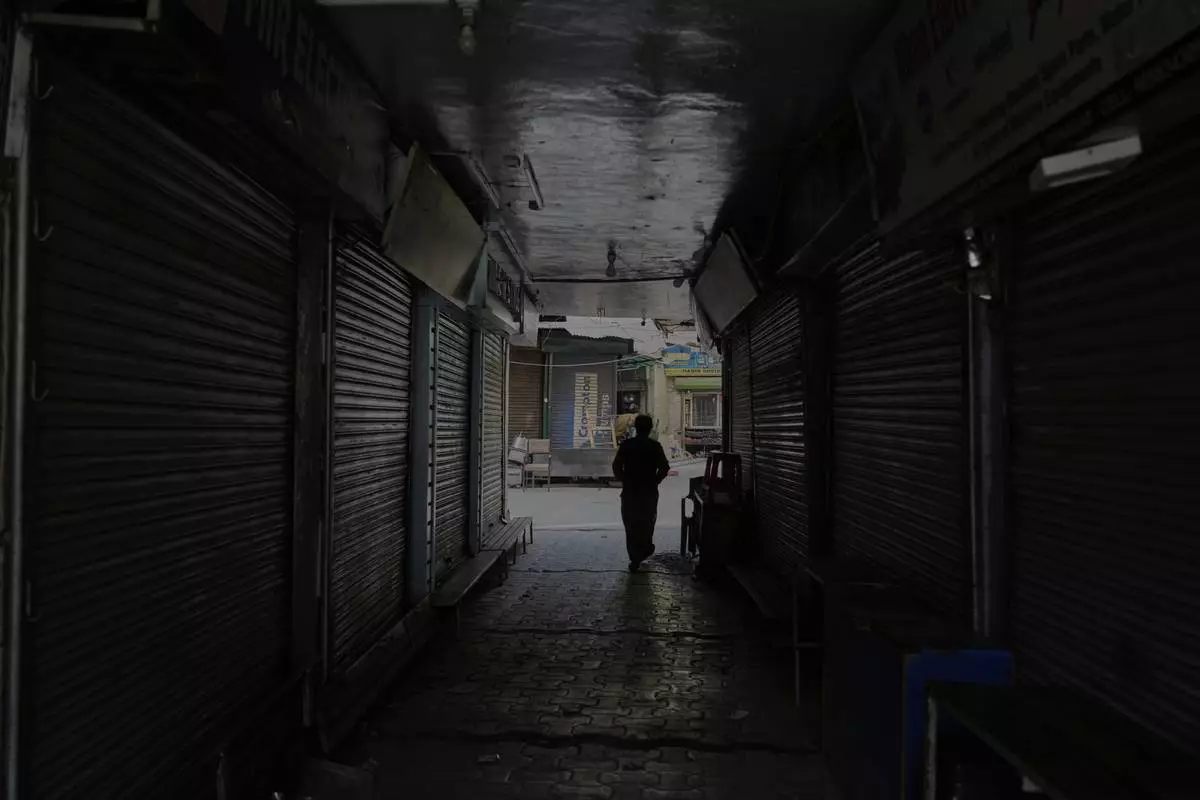
A Kashmiri man walks inside the Auqaf Market in Srinagar, Indian controlled Kashmir, Wednesday, April 2, 2025. (AP Photo/Mukhtar Khan)
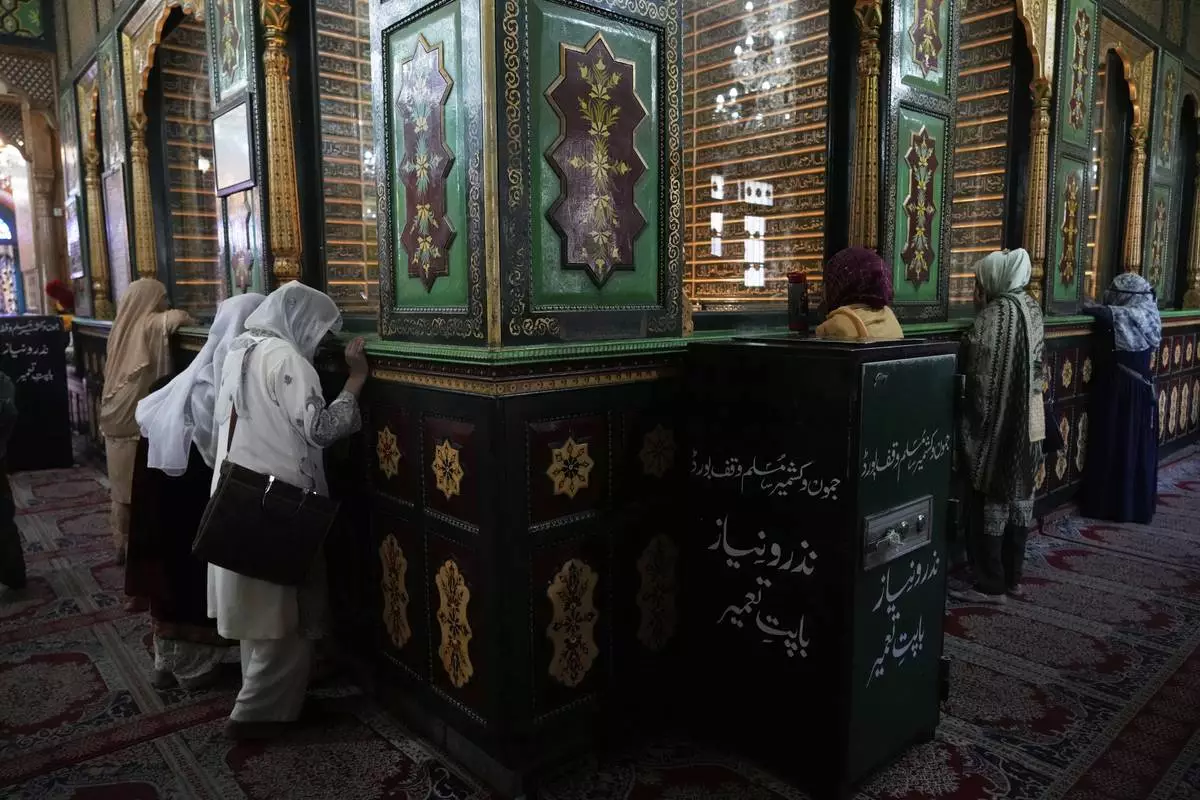
Kashmiri Muslims pray inside the shrine of Sheikh Abdul Qadir Jeelani, commonly known as Dastageer Sahib, in Srinagar, Indian controlled Kashmir, Wednesday, April 2, 2025. (AP Photo/Mukhtar Khan)
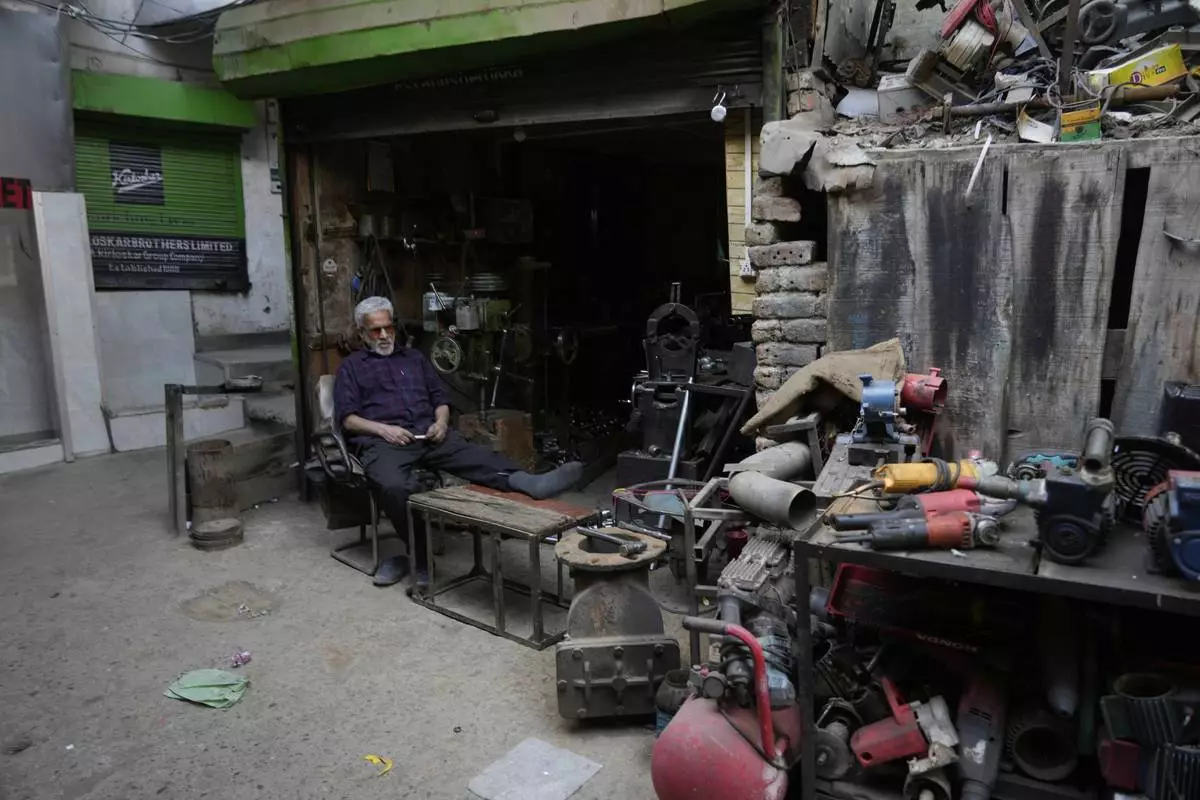
Bashir Ahmad, a Kashmiri shopkeeper, rests at his shop inside the Auqaf Market in Srinagar, Indian controlled Kashmir, Wednesday, April 2, 2025. (AP Photo/Mukhtar Khan)
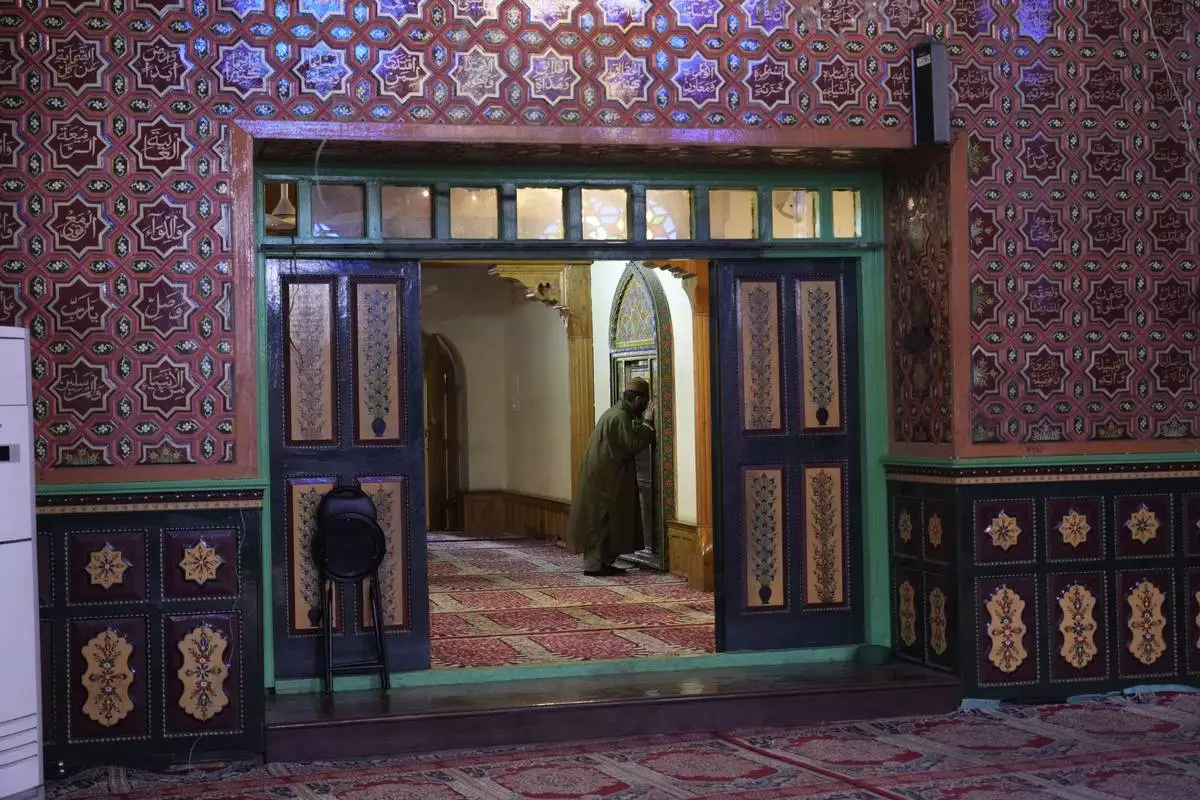
A Kashmiri Muslim man prays inside the shrine of Sheikh Abdul Qadir Jeelani, commonly known as Dastageer Sahib, in Srinagar, Indian controlled Kashmir, Wednesday, April 2, 2025. (AP Photo/Mukhtar Khan)
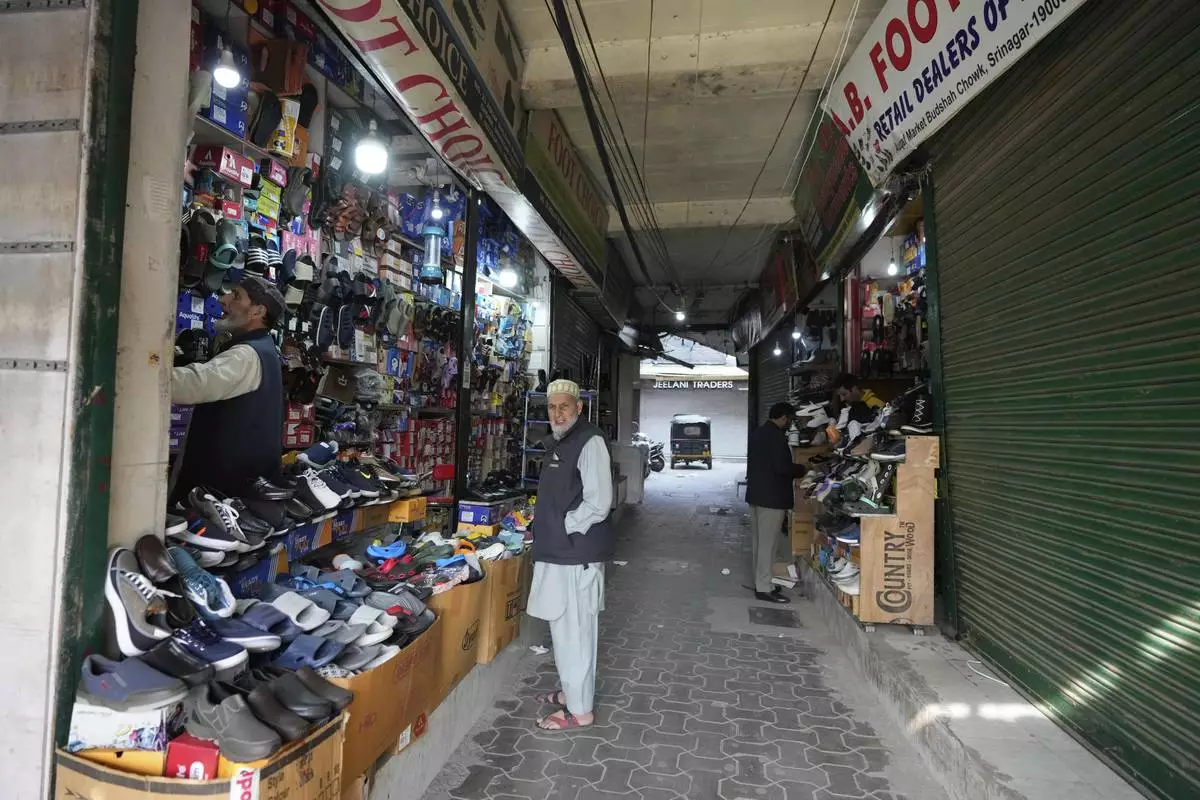
Kashmiri men purchase shoes inside the Auqaf Market in Srinagar, Indian controlled Kashmir, Wednesday, April 2, 2025. (AP Photo/Mukhtar Khan)
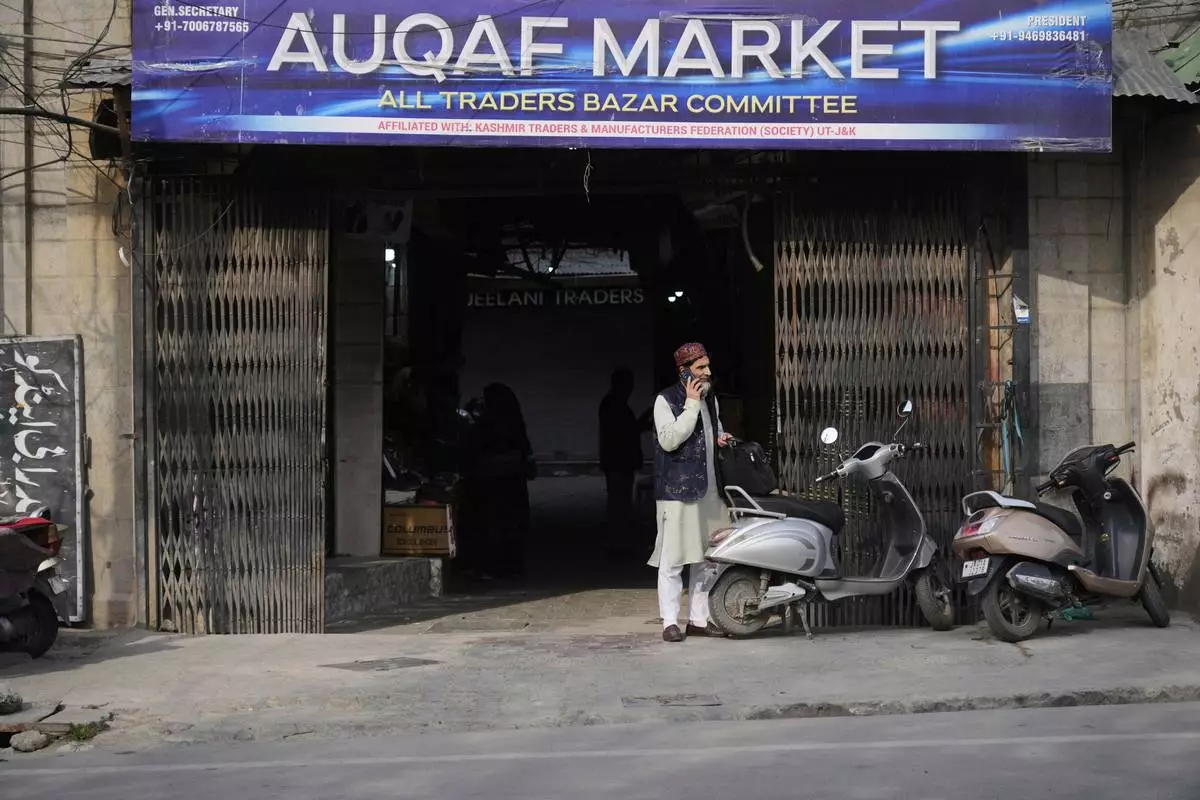
An elderly Kashmiri man talks on his cell phone outside the Auqaf Market in Srinagar, Indian controlled Kashmir, Wednesday, April 2, 2025. (AP Photo/Mukhtar Khan)
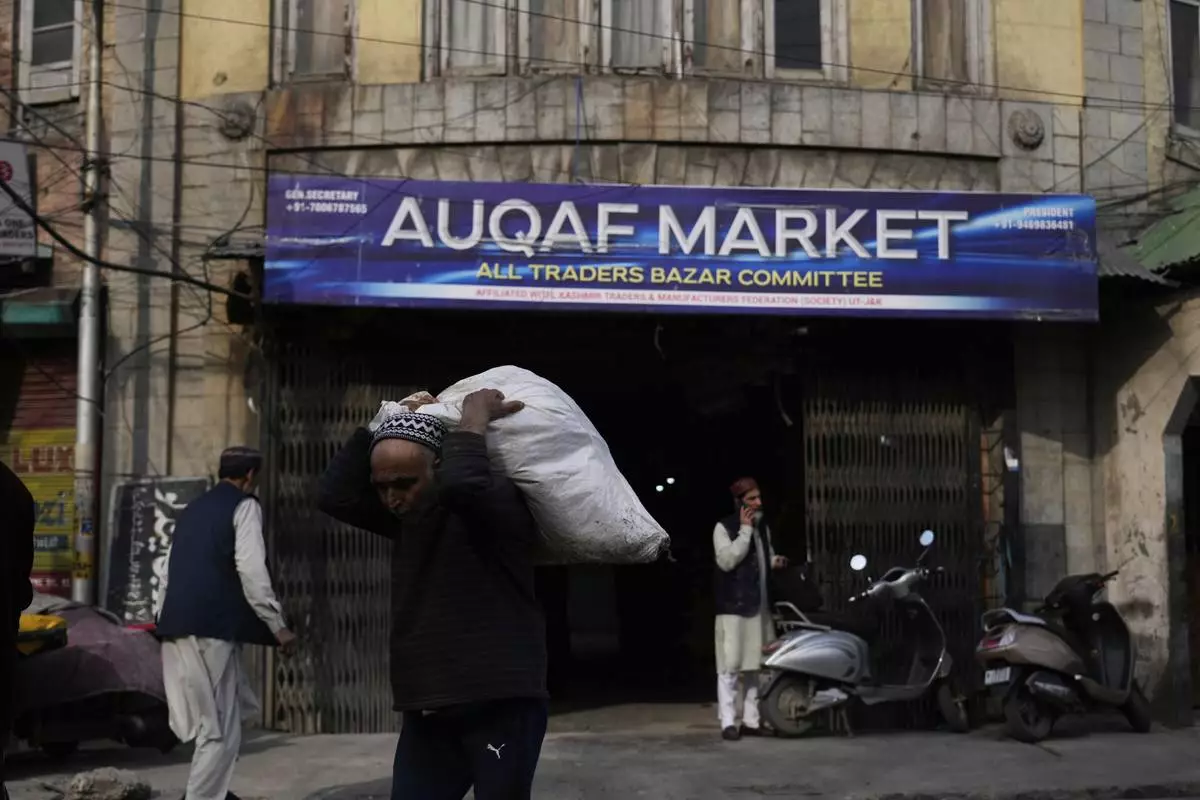
An elderly Kashmiri man carries a plastic sack filled with fabric as he walks outside the Auqaf Market in Srinagar, Indian controlled Kashmir, Wednesday, April 2, 2025. (AP Photo/Mukhtar Khan)
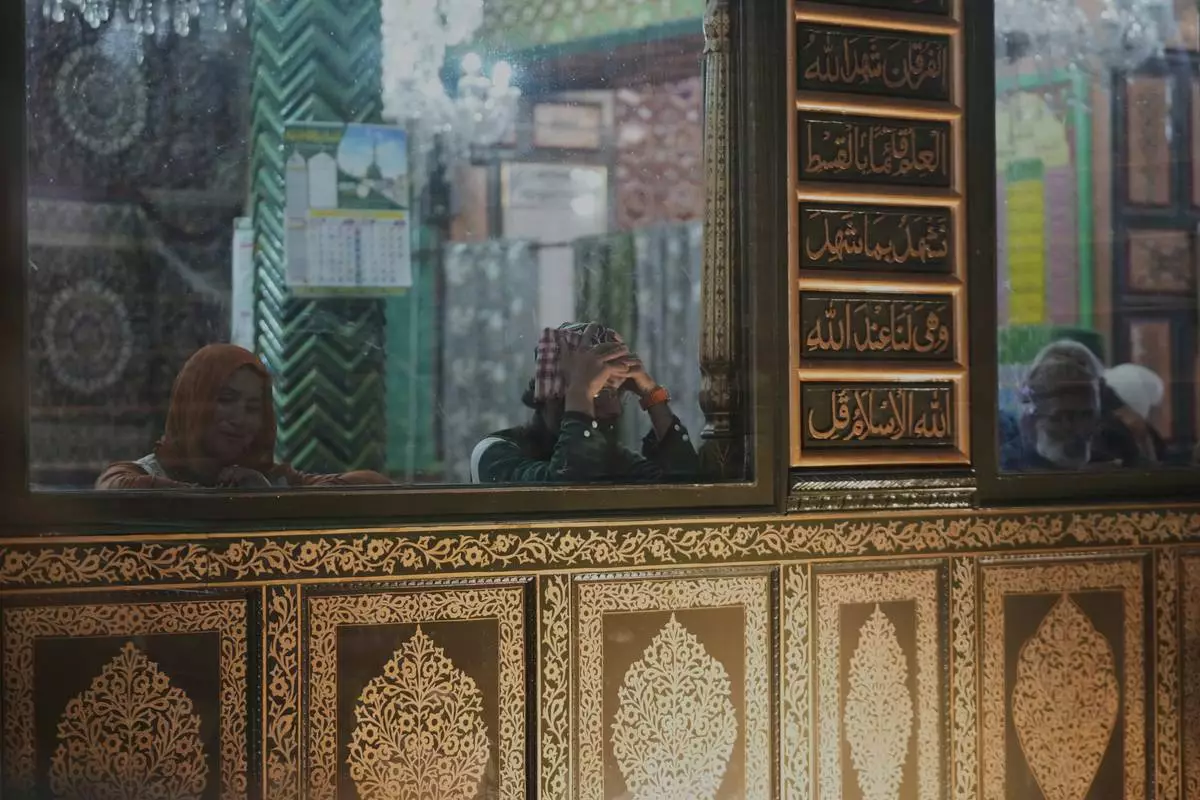
Kashmiri Muslims pray inside the shrine of Sheikh Abdul Qadir Jeelani, commonly known as Dastageer Sahib, in Srinagar, Indian controlled Kashmir, Wednesday, April 2, 2025. (AP Photo/Mukhtar Khan)
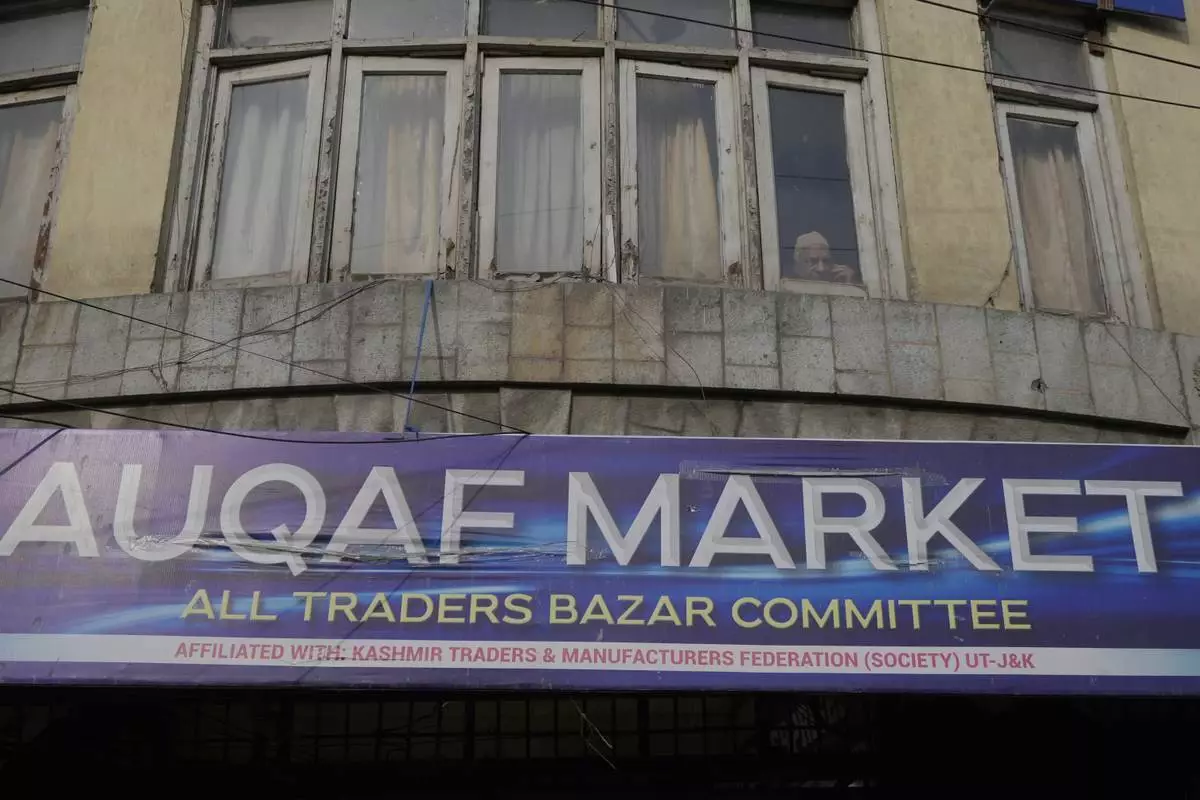
A man looks from a window near the Auqaf Market in Srinagar, Indian controlled Kashmir, Wednesday, April 2, 2025. (AP Photo/Mukhtar Khan)
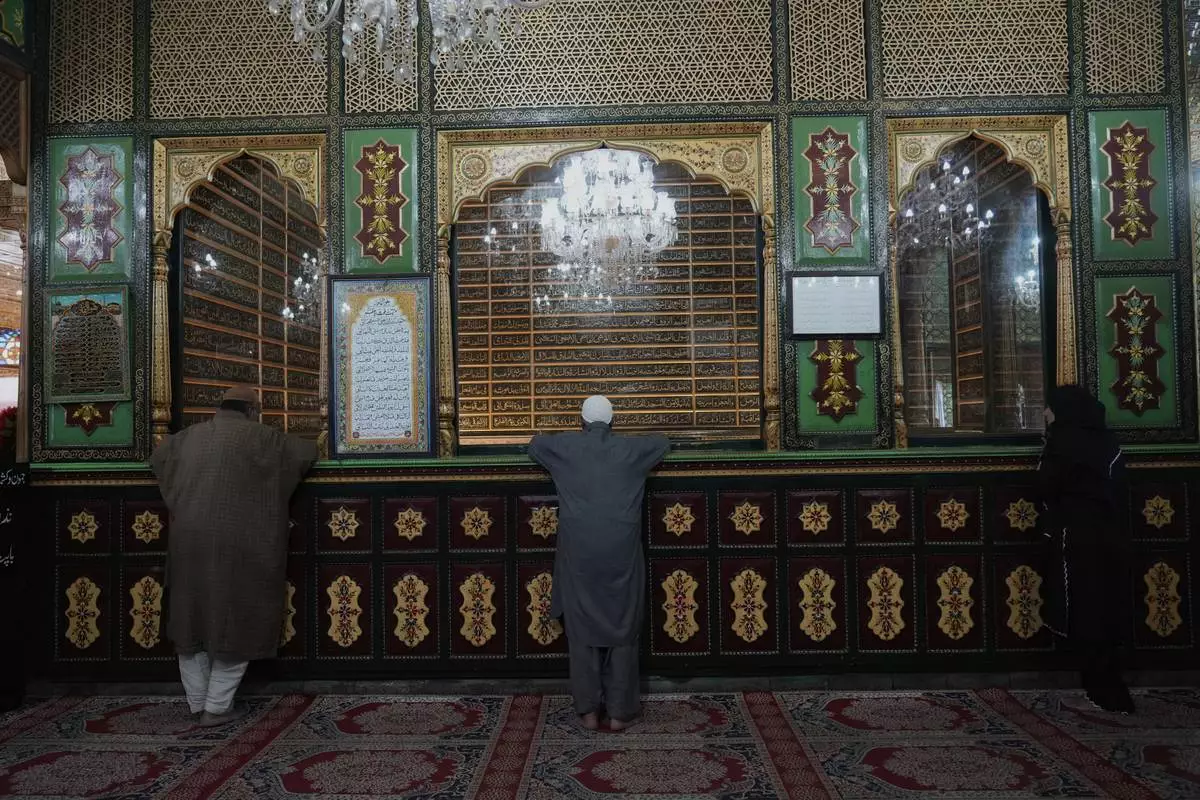
Kashmiri Muslims pray inside the shrine of Sheikh Abdul Qadir Jeelani, commonly known as Dastageer Sahib, in Srinagar, Indian controlled Kashmir, Wednesday, April 2, 2025. (AP Photo/Mukhtar Khan)
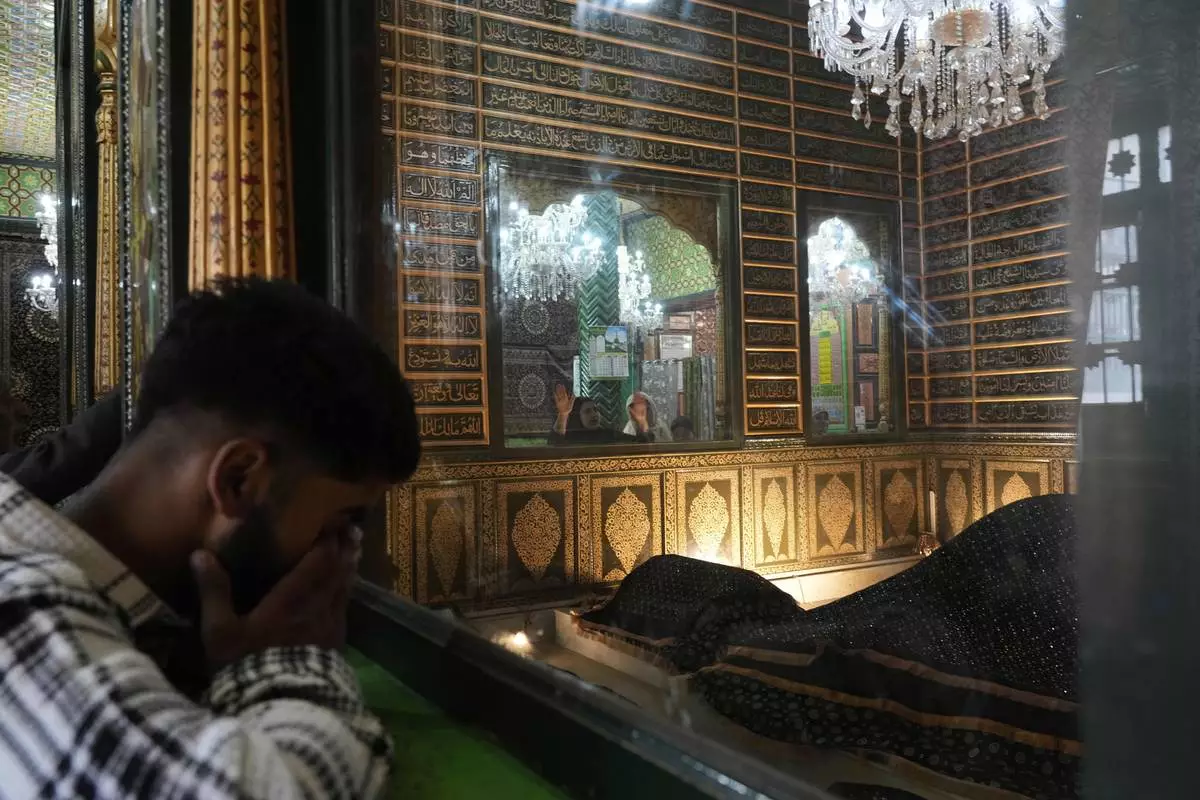
Kashmiri Muslims pray inside the shrine of Sheikh Abdul Qadir Jeelani, commonly known as Dastageer Sahib, in Srinagar, Indian controlled Kashmir, Wednesday, April 2, 2025. (AP Photo/Mukhtar Khan)
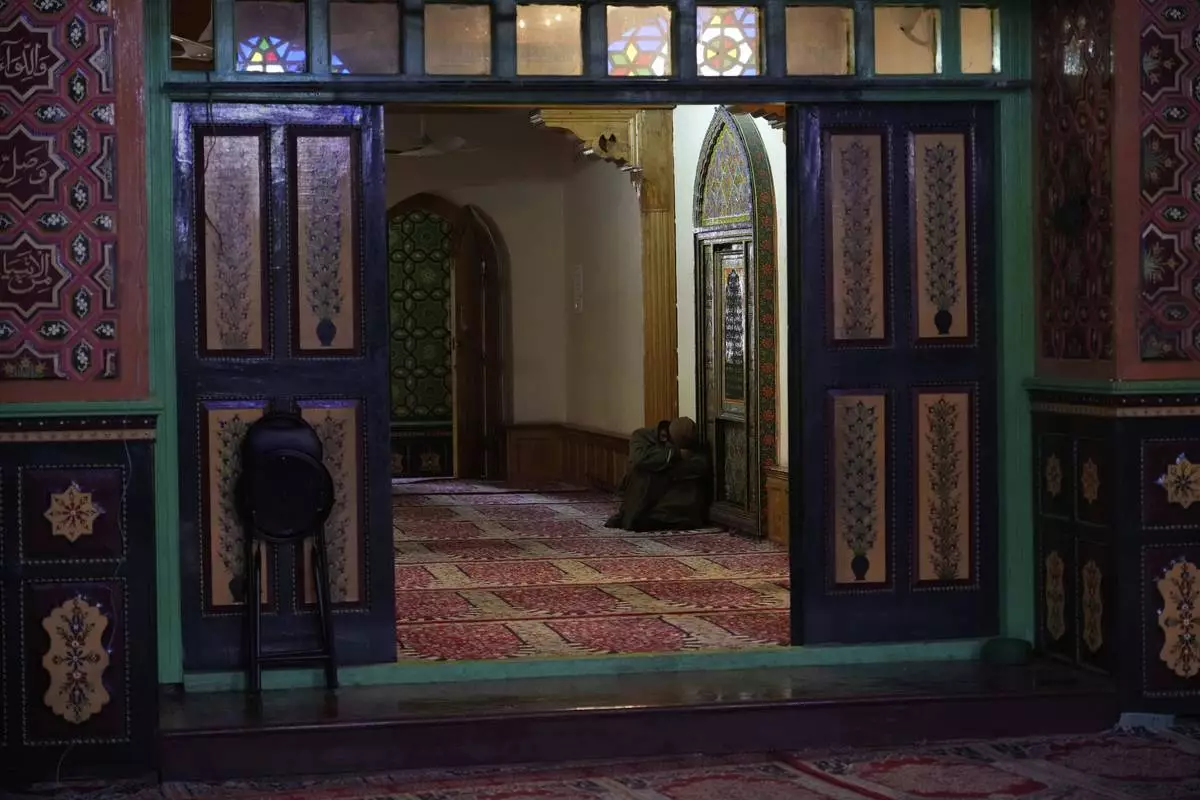
A Kashmiri Muslim man prays inside the shrine of Sheikh Abdul Qadir Jeelani, commonly known as Dastageer Sahib, in Srinagar, Indian controlled Kashmir, Wednesday, April 2, 2025. (AP Photo/Mukhtar Khan)
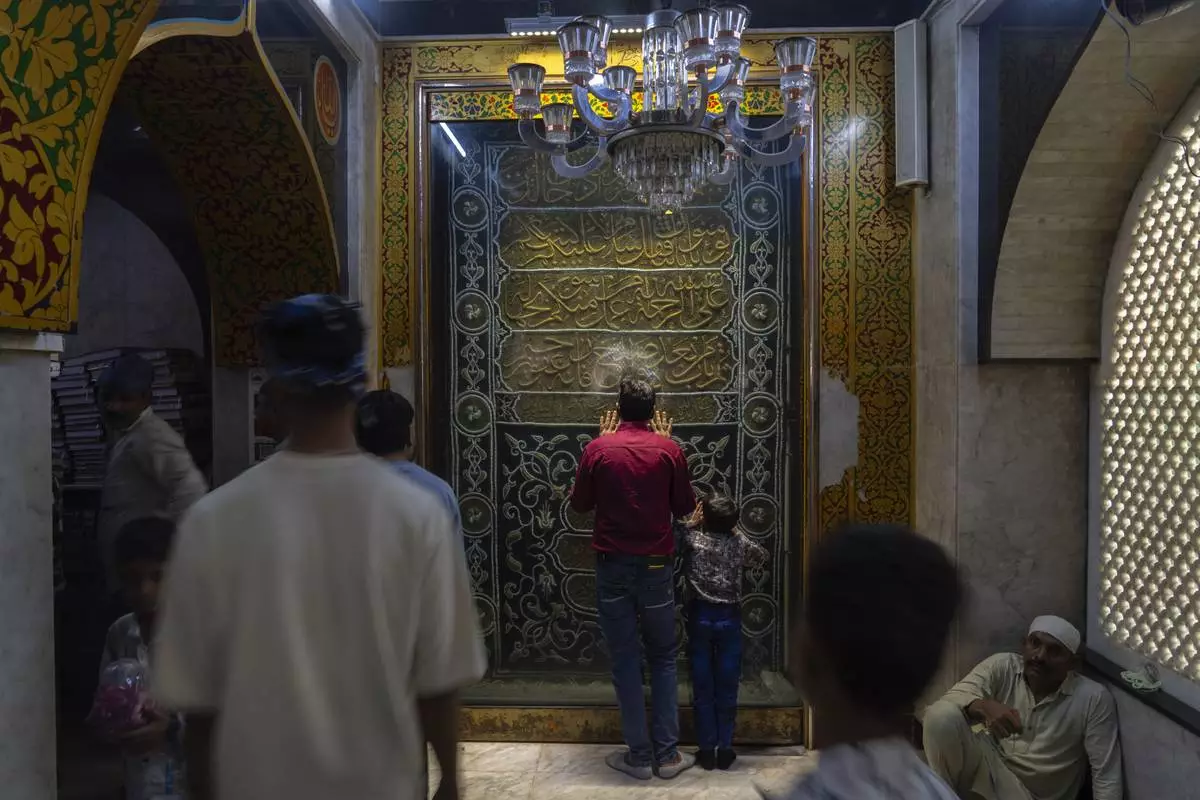
A Muslim man offers prayers at Mahim Dargah, a Muslim shrine in Mumbai, India, Wednesday, April 2, 2025. (AP Photo/Rafiq Maqbool)
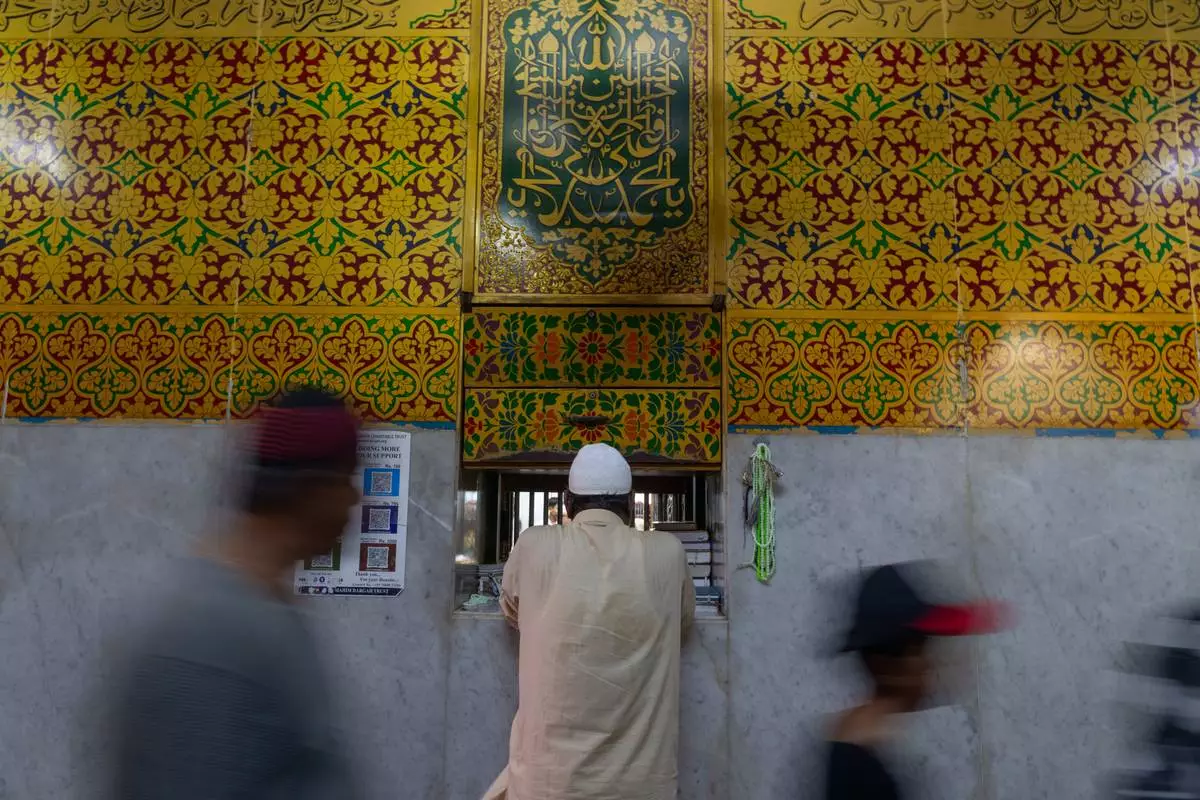
A Muslim man offers prayers at Mahim Dargah, a Muslim shrine in Mumbai, India, Wednesday, April 2, 2025. (AP Photo/Rafiq Maqbool)
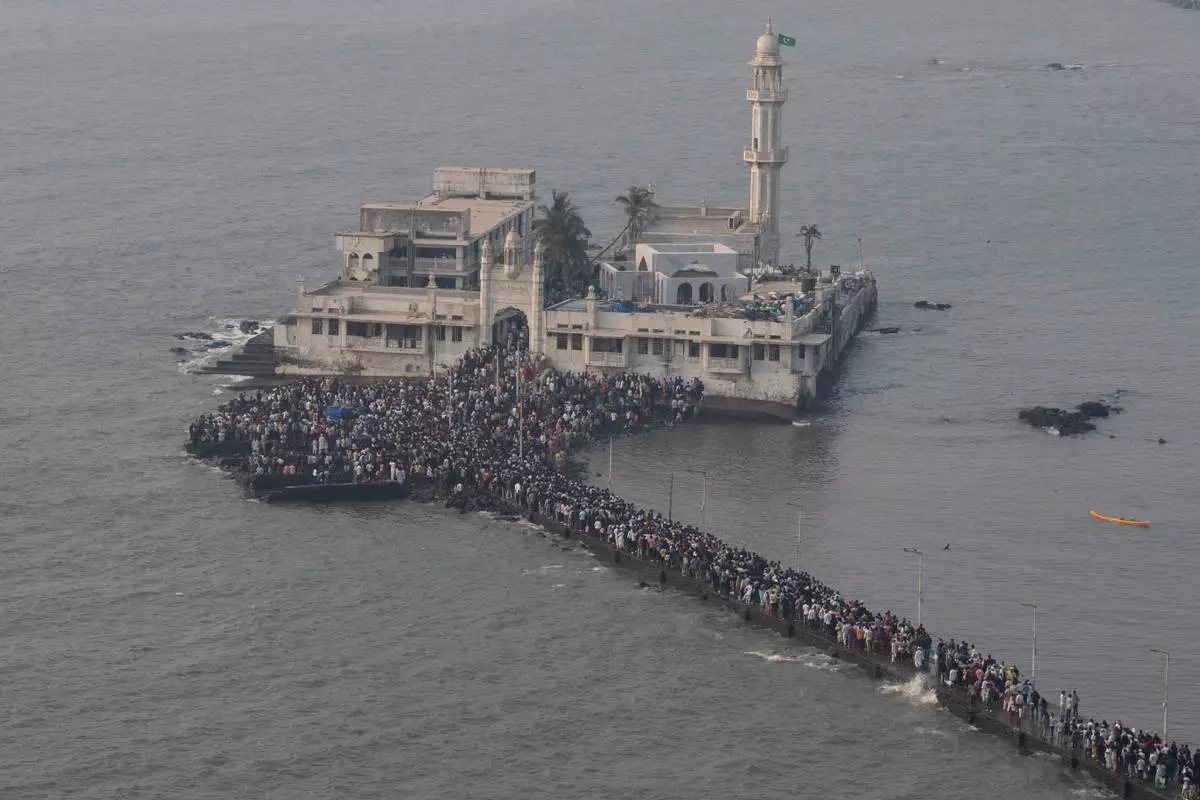
People arrive to offer prayers at Haji Ali Dargah, a Muslim shrine by the Arabian Sea coast in Mumbai, India, Wednesday, April 2, 2025. (AP Photo/Rafiq Maqbool)
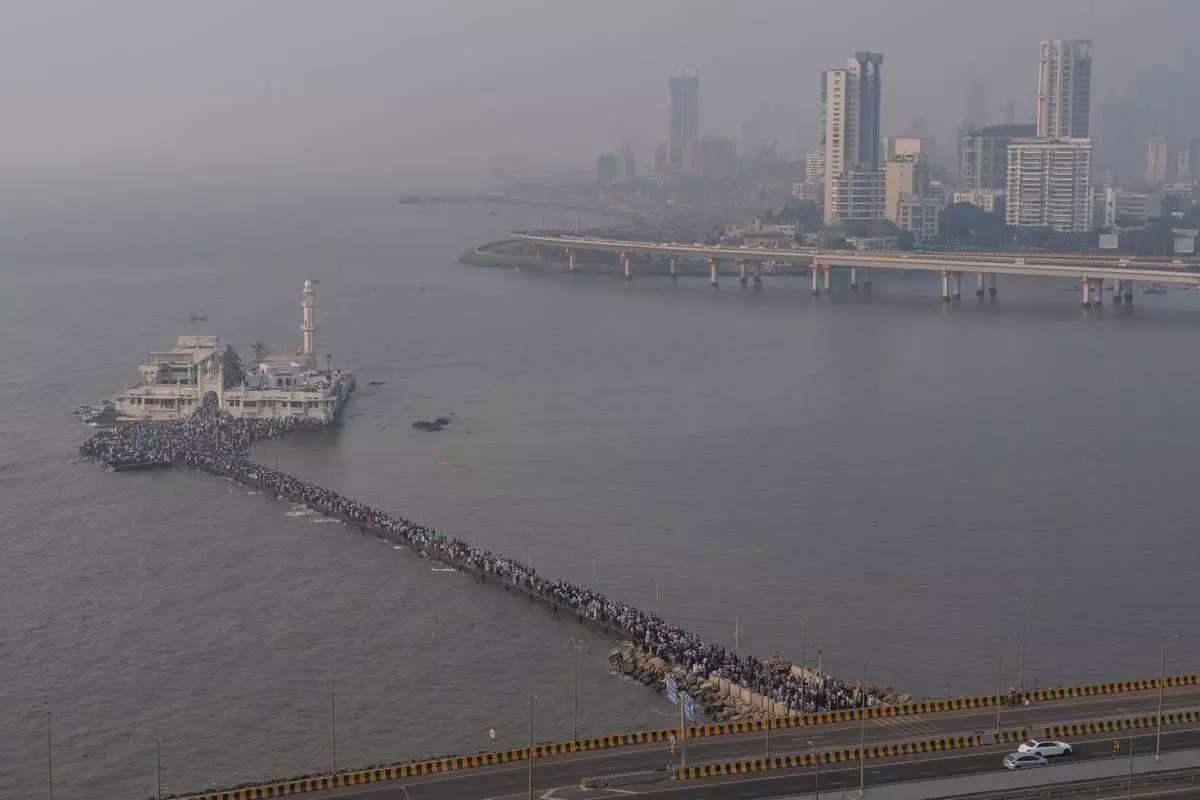
People arrive to offer prayers at Haji Ali Dargah, a Muslim shrine by the Arabian Sea coast in Mumbai, India, Wednesday, April 2, 2025. (AP Photo/Rafiq Maqbool)
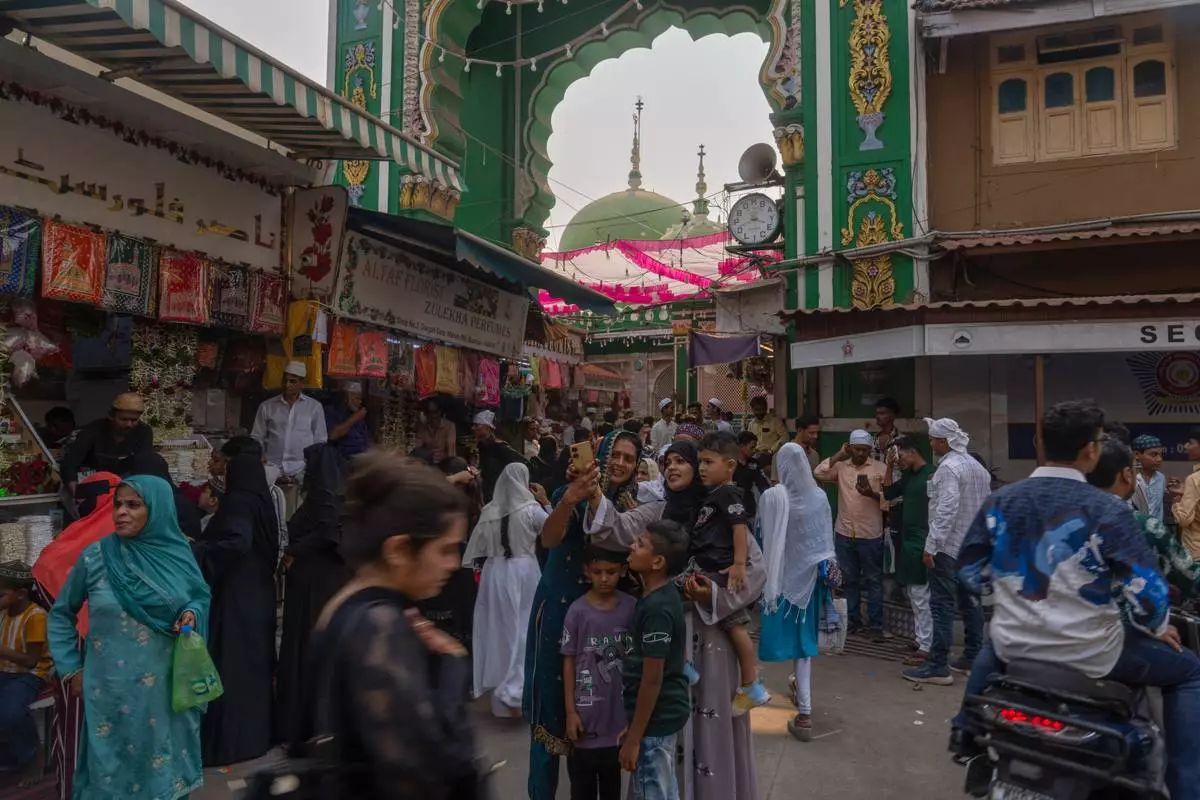
Muslims leave after offering prayers at Mahim Dargah, a Muslim shrine in Mumbai, India, Wednesday, April 2, 2025. (AP Photo/Rafiq Maqbool)
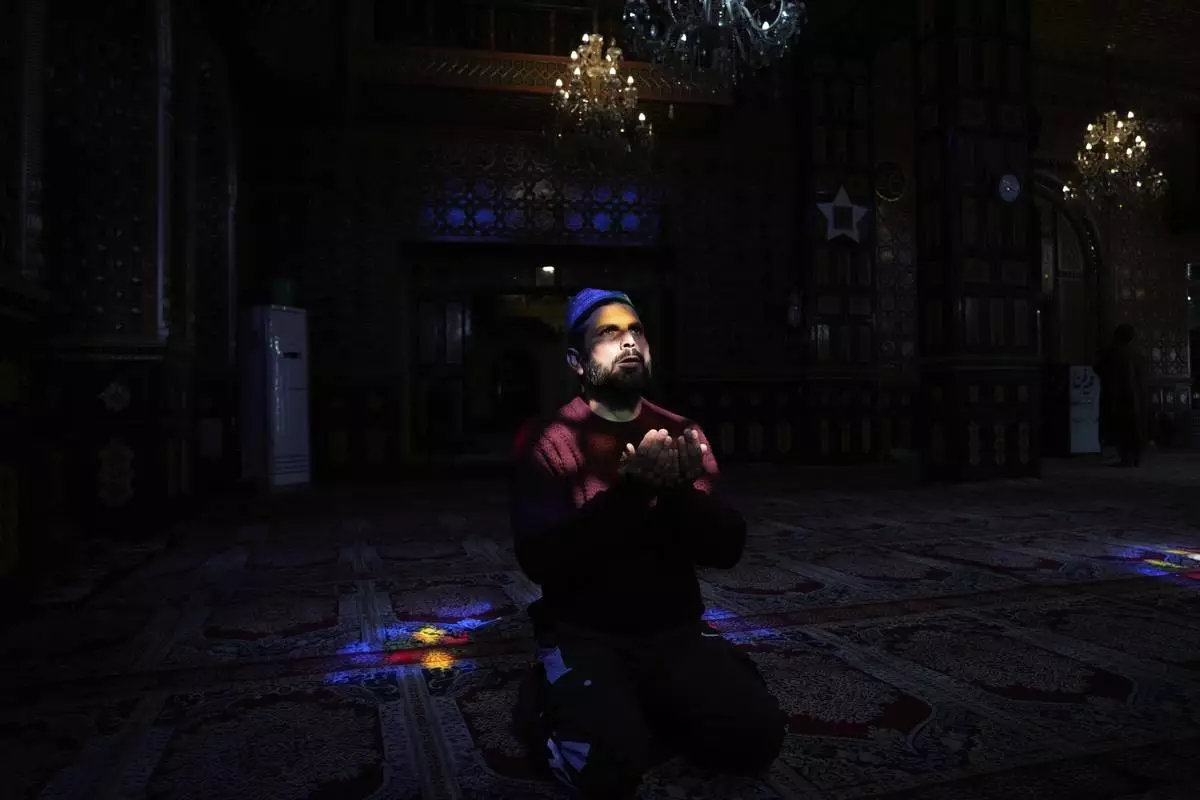
A Kashmiri Muslim man prays inside the shrine of Sheikh Abdul Qadir Jeelani, commonly known as Dastageer Sahib, in Srinagar, Indian controlled Kashmir, Wednesday, April 2, 2025. (AP Photo/Mukhtar Khan)




